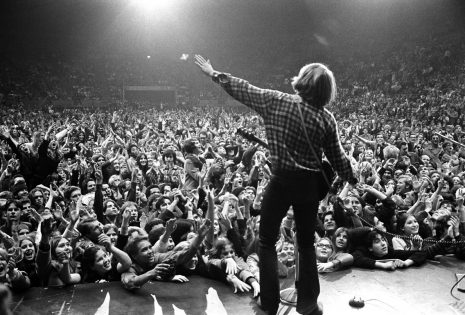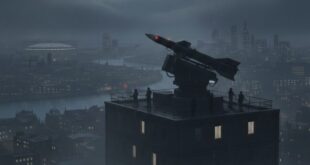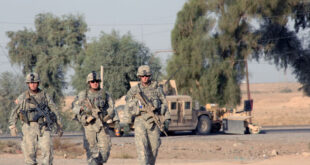
52 years later, rock legend Fogerty remembers time in Army
By Eric Pilgrim, Fort Knox News
While marching back and forth on a hot Kentucky asphalt parade field in the spring of 1967, musical lyrics began to dance around inside John Fogerty’s head —
“It’s been an awful long time since I been home …”
What he recently described as a kind of transcendental meditation, or delirium, would sweep over him during those long hours marching at Fort Knox, a delirium that afforded him time to think about his life, and his dreams —
“But you won’t catch me goin’ back down there alone …”
More than 50 years later, Fogerty is celebrating a half-century of powerful rock music he has created, music that critics often agree helped shape the mindset of many young men and women during and after the Vietnam War era. Before there was Credence Clearwater Revival, however, there was a 20-year-old man trying to make his way on a very different path.
“I was internationally unknown back then,” said Fogerty earlier this month, during a short break in his “John Fogerty: My 50-Year Trip” North American tour, including a stop in Louisville Sept. 20 to perform in the Kentucky Fair and Expo Center at Bourbon & Beyond 2019.
As a war in Vietnam was beginning to ramp up in 1966, Fogerty walked into a recruiter’s office around the same time his draft number came up. Whether as a draftee or volunteer, he expected that he would be joining the military. When he left the recruiter’s office, he signed on with the U.S. Army Reserve as a supply clerk.
“I was on active duty for six months, but I was in the Reserves between 1966 and 1968,” said Fogerty.
Soon after enlisting, he went through basic training at Fort Bragg, North Carolina.
Between his time at Fort Bragg and advanced individual training at the Quartermaster School in Fort Lee, Virginia, he found himself stationed at Fort Knox.
“It was pretty intense because this was right at the height of the Vietnam War,” said Fogerty. “Every young man’s clock was running pretty fast.”
As he talked about his time at Fort Knox, memories bubbled up to the surface.
“At various times, we had a kind of special guard duty for 24 hours straight,” said Fogerty. “We had to polish all our brass and our boots were highly spit-shined. Your uniform had to be perfect. We went to a different place where we were on for two hours and then off for about eight.”
He said one particular guard duty shift left a mark on him.
“After I had been there only about five or 10 minutes, I had just walked in, there were two or three guys crowded around this one wall. They were looking at Elvis Presley’s signature — It said, ‘Elvis Presley ’58,'” said Fogerty. “I wish I’d had a camera. Back in those days, we didn’t have phones with cameras in them.”
He remembered another time when he decided against going into Louisville on a weekend pass. That same weekend was Kentucky Derby weekend, and he gave a friend of his money to place a bet on a horse in the race — a horse named Damascus.
“I had given my friend $6 but I was always conservative, so I wanted him to make the safest bet, which was for the horse to come in third,” said Fogerty.
Damascus did come in third, but Fogerty didn’t receive any prize money.
“He had bet on that horse to win,” said Fogerty, laughing.
Fogerty shares the Fort Knox alumni stage with another musical great — 1950s rocker Buddy Knox. While stationed at the installation in 1957, Knox was sent to the Ed Sullivan Show to perform two of his big hits at that time.
Fogerty remembered watching that show.
“I saw him on TV wearing his military uniform. He had a heck of a year in ’57. He was part of three different singles that each sold a million,” said Fogerty. “He was with a guy named Jimmy Bowen. On Jimmy Bowen’s record it reads, ‘Jimmy Bowen and the Rhythm Orchids,’ and you assume that was some backing band.
“Well, on Buddy Knox’s record, it reads, ‘Buddy Knox and the Rhythm Orchids,’ and that meant the other person was Jimmy Bowen. [Buddy Knox] had one of the biggest careers of anybody, all in that year.”
While music has played a big role throughout Fogerty’s life, he said no matter how far he travels to perform for others, he is never far away from his military identity.
“Sometimes it shows up in ways you can identify, and you’re really proud of that, especially personal discipline,” said Fogerty. “At other times, it’s just part of what makes you you. I think almost anybody who’s been in the military realizes that there’s a certain amount of maturity you have. You can’t help it; you either shape up or ship out — most of us choose to shape up.”
His military experience is not one he shies away from admitting.
“Life is what it is so you can’t change it, but I certainly am proud of that time,” said Fogerty. “There’s a lot of insight that you learn about getting along with people and what is the mindset inside the military, and I’m not talking about people who make policy. I mean grunts like who I was who are cogs in the wheel.
“You really do learn how to discipline yourself and be part of a team that helps make things flow because that’s part of your job.”
Fogerty said his military identity also comes out from time to time in his songs. While the most famous of these is the hit “Fortunate Son,” there are others.
“I have a song called ‘Wrote a Song for Everyone.’ It’s a bit mysterious, but it comes from a guy who went through the military at a very emotional and volatile time in history,” said Fogerty. “And a lot of the songs that talk about, or are reflective of my personality — taking note of class structure or the inequality of the way society works — certainly, those are references to my time in the military.”
Some of the songs have a more direct tie to his military background —
“They came and took my dad away to serve some time, but it was me that paid the debt he left behind …”
A lesser-known hit penned by the man Rolling Stones magazine named the 40th Greatest Guitarist and 72nd Greatest Singer of all time, “Porterville” became the first song the Golliwogs released after they changed their name to Credence Clearwater Revival.
The song was conceived in the heat of central Kentucky, according to Fogerty, forged by a young Soldier marching for countless hours on a 1-mile square asphalt parade field, dreaming of someday becoming a rock star.
 Soldier of Fortune Magazine The Journal of Professional Adventurers
Soldier of Fortune Magazine The Journal of Professional Adventurers





